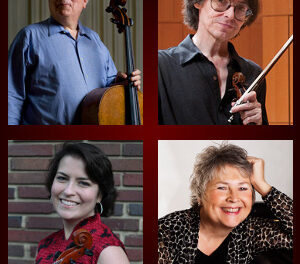There have been notable plays about the pretentions of the art world and intriguing works about characters pretending to be someone they’re not. At first glance, James Ijames‘ 2015 White might seem a mere retreading of these familiar themes, wrapped in a raucous satire. That’s exactly what he wants you to think as you’re drawn into comfortable territory with lots of laughs. But once you’re settled in, Ijames flips all expectations to take you on a fantastical and disturbing ride. Bulldog Ensemble Theater‘s striking production engages the audience from the first minutes and doesn’t let up until it sends everyone home in a daze.
The 90-minute one-act’s plot is set in motion when Gus, an on-the-rise painter, learns his long-time friend Jane has been made head of a prestigious art museum. She’s out to make a name for herself, so she decides that her debut exhibition will be contemporary American art by the oppressed and marginalized. Gus is desperate to be included and, at first, assumes he’ll get in because he’s gay. But Jane informs him he’s still a white male and therefore she won’t consider him. (It doesn’t help that all his paintings are in various tints of white.)
Gus protests that he’s also been marginalized and feels he’s being wrongly excluded. Jane and Tanner, Gus’ boyfriend, try to convince Gus that he hasn’t suffered oppression like women and people of color have, but Gus is so angry that he wants revenge. He hires Vanessa, a young black actress, to pretend to be an artist and apply for the exhibition using Gus’ paintings. He and Vanessa make up a suitable biography for the faux artist, including a distinctive new name, Balkonaé. The idea works and Gus begins planning how he’ll expose Jane’s hypocrisy and gain some benefit from the attendant publicity.
Up to this point, there’s been broad skewering of big targets but, without giving anything away, it’s safe to say that things veer wildly out of hand, spinning into a surreal finale that will leave you in awe of Ijames’s risk taking.
Bulldog’s production is in the round, the audience in four tiered quadrants that face in to a small central acting space. White, sheer material is draped above, forming a tent-like environment that adds a hothouse effect. Two white, cushioned benches and a white easel holding Gus’ paintings (nicely rendered by Michelle David Petelinz) are the only set pieces, allowing the play to flow effortlessly from scene to scene, with actors making any necessary adjustments. Lisa Suzanne Turner’s lighting contributes to the surreal atmosphere pervading many of the scenes.
Jameeka Holloway-Burrell has gone from strength to strength in her local directing projects and is amassing an impressive résumé from productions around the country. Here, she has displayed a firm hand and imaginative take on the script’s messages. The energetic pacing enhances the bold characterizations she asks for, and her staging makes sure all four audience sections get equal access to the action (a skill few directors seem to fully understand and apply when working on thrust and in-the-round productions).
At the third performance in the run, the actors were confident and fully committed to their roles. Jordan Clifton’s high-maintenance Gus and A.C. Donohue‘s gushing Jane emphasized the characters’ selfishness and cluelessness, almost to caricature, but that merely laid groundwork for startling new aspects revealed later. Raely Qiu’s Tanner, Gus’ long-suffering boyfriend, was the quiet voice of reason as he attempted to steer Gus away from his wrong-headed plan. Clifton and Qiu were especially adept at playing the levels in an unflinching love-making scene that goes awry.
Monét Noelle Marshall‘s Vanessa started out curious but skeptical about Gus’ scheme but grew more compliant as she saw that it could bring her longed-for visibility as a person to be reckoned with. Marshall continued to reveal her admirable range as Vanessa gained self-worth and empowerment as Balkonaé, not to mention Marshall’s embodiment of a third character not to be revealed here. And just when her prodigious talent seemed all revealed, her final monologue changed admiration to awe.
It’s hard to explain the impact of this production, but it’s enough to say that the audience often laughed uproariously, yet, in a handful of instances, let out collective gasps and sudden intakes of breaths in reaction to what one character said to another. The show should certainly be a topic of conversation on the drive home, as it hammers home the prejudices and privileges that keep large segments of society from a full seat at the table.
Kudos to the Bulldog Ensemble Theater team for a fine first season, especially this production and April’s nigh-perfect In a Word. The company’s intention of carrying on the tradition of now-closed Manbites Dog Theater is already fully realized.











